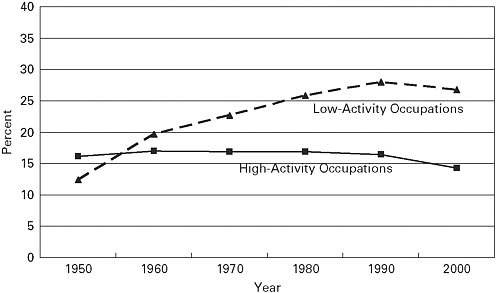Today, more than two out of three adults are considered to be overweight or obese. The statistic probably surprises no one. However, considering that the obesity epidemic contributes to $147 billion to $210 billion dollars in preventable healthcare spending, this issue is becoming increasingly relevant to employers.
There are a plethora of variables that have attributed to this massive change in society, including technology, dietary changes, cultural attitudes, etc. One largely ignored concept does the best job of encapsulating all of the diverse factors into one key driver of obesity: Non-Exercise Activity Thermogenesis (NEAT). NEAT is defined by James Levine of the Mayo Clinic as, “energy expended that is not from sleeping, eating or sports-like exercise. It ranges from the energy expended walking to work, typing, performing yard work, undertaking agricultural tasks and fidgeting.”

You may have already guessed where this is going, but as obesity rates have risen, NEAT has dramatically decreased. The proliferation of white collar jobs, labor-reducing technologies, ease of communication, and general cultural changes have all culminated to reduce NEAT to a significant degree.
One study conducted by researchers in Germany focused on finding meaningful mechanisms for fighting the obesity epidemic, aiming to analyze whether increased caloric intake alone could be responsible for the rise in obesity and how much NEAT comes into play with overall caloric balance. They found that NEAT could vary an individual’s caloric expenditure by 2,000 kcals per day on average. Given the popularity of the 2,000-calorie-a-day diet, this result is dramatic.
These findings in conjunction with the general decrease in NEAT make sense. Think about it, gym memberships and fitness classes have exploded in popularity, and pretty much everyone has tried some sort of diet at some point. Despite these meaningful efforts to reverse the obesity trends, how does it keep going up? Of course, the answer is that NEAT has been largely ignored.
What can employers learn from this? Simple, promoting exercise and diet changes may not be the answer to better employee health. Employers should encourage more walking meetings or taking the stairs rather than the elevator. They should create workplaces that promote movement. Over the course of weeks, months, and years, these small behavioral changes that require no added commitment of time by employees will lead to a significantly healthier, more productive, and cheaper to manage the workforce.












